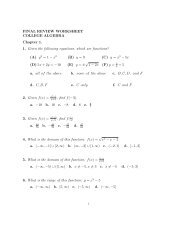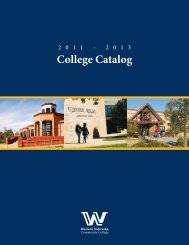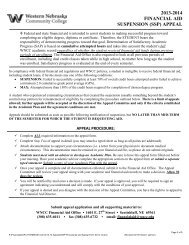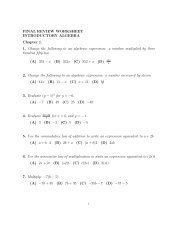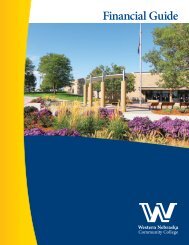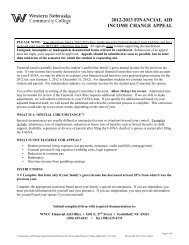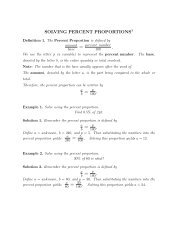WNCC 2010 Self-Study Report - Western Nebraska Community ...
WNCC 2010 Self-Study Report - Western Nebraska Community ...
WNCC 2010 Self-Study Report - Western Nebraska Community ...
Create successful ePaper yourself
Turn your PDF publications into a flip-book with our unique Google optimized e-Paper software.
Faculty members are working on plans to cluster courses by type or discipline area in order to<br />
gauge a net effect on student learning for instances when things like capstone projects or courses,<br />
external certification, or other summative measures are not in place. For instance, the English<br />
Composition 1 course is ubiquitous, as are many of the social science courses like Introduction to<br />
Psychology. They appear in the suggested curriculum for nearly every emphasis area option. If<br />
these courses can be bundled into logical units, another form of measurement becomes available.<br />
However, with the adoption of eLumen, that may prove less important because the information<br />
from individual courses and general education learning results can be streamed together, and even<br />
specifically selected elements from a designated rubric can be used.<br />
Course-Level Assessment<br />
Course-level assessment happens by using activities selected by faculty members to determine<br />
whether or not students are learning intended outcomes across the various sections of the same<br />
course. The faculty members review data to determine any need for change in the course<br />
curriculum or instructional delivery.<br />
Starting in the fall of 2006, <strong>WNCC</strong> faculty members began a process of creating or updating course<br />
competencies, which were written to illustrate what students should know or be able to do when<br />
they completed the course. This process is still ongoing; however, the majority (85%) of classes<br />
have competencies in place. Competencies for all courses currently in the rotation for offering are<br />
slated to be finished by the end of the fall term of 2009. The next step is to tie those competencies<br />
to assessment activities in every course in order to verify students’ mastery of the concepts.<br />
Instructors have been educated on the purpose of course competencies to serve as guides for<br />
students and instructors alike by detailing the key knowledge, skill, or behavioral learning goals and<br />
competency standards for the course. The competencies for each course are being put into the<br />
master syllabi as those documents are reviewed, and instructors are listing them on their individual<br />
course syllabus or course outline as well. The competencies for multiple-sections courses are<br />
determined by the group of instructors who teach the course. A single set of them is denoted by<br />
the Division Chair as the “master” competencies so that they are the same for each individual<br />
section taught at any location or by any instructor. The course competencies are dynamic in that<br />
they are changed or refined from time to time.<br />
Institutional-Level Assessment<br />
When <strong>WNCC</strong> began its assessment work in the mid-1980s, it began with institutional assessment.<br />
This was prior to the HLC initiative; therefore, the other levels of assessment did not come until<br />
later. Since 1986, <strong>WNCC</strong> has used ASSET and more recently eCompass tests for mandatory<br />
placement in English, reading, and mathematics courses. A parameter sheet outlining the cutscore<br />
for course placement is used for advising the appropriate course.<br />
CAAP Tests<br />
<strong>WNCC</strong> utilizes the Collegiate Assessment of Academic Proficiency (CAAP) test for all degree<br />
seeking students. The College reviews the results to confirm program strengths and to identify<br />
areas that need strengthened. The results across the last five years were presented in Criterion 2,<br />
under Core Component 2C.<br />
Page 102<br />
<strong>Western</strong> <strong>Nebraska</strong> <strong>Community</strong> College



